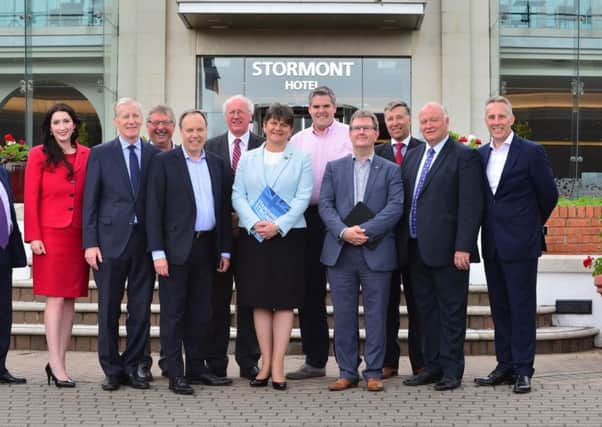Ben Lowry: Hardball DUP tactics in Tory talks could one day rebound on unionism


It said that for 36 hours Downing Street was trying to phone DUP negotiators but they were not answering their phones “as talks veered dangerously close to breaking down altogether”.
There was said to be disagreement between the two parties over a DUP demand for £2 billion for Northern Ireland, half for the NHS, half for infrastructure.
Advertisement
Hide AdAdvertisement
Hide AdThe Daily Telegraph has traditionally been close to the Conservative Party, so you would expect its reporters to have good sources. The story was not denied by the DUP.
People who are senior in the DUP that I spoke to yesterday implied that there would soon be agreement between them and the Tories and that relations between the parties were fine.
It makes sense for the DUP to use its rare current influence at Westminster to get things for unionism and Northern Ireland, including money for the latter.
But hardball tactics such as not answering the phone to a prime minister’s office are not the sort of thing you would expect in a negotiation between friends, as Theresa May described the DUP the day after the election.
Advertisement
Hide AdAdvertisement
Hide AdThe DUP has been saying it is used to negotiations. But however used it might be to navigating Stormont dramas, the Tory Party is vastly larger and can draw on much bigger pools of talent and overall political experience.
The main unionist sympathisers in Great Britain are in the Conservative Party and the right wing press.
In his memoir about editing the Daily Telegraph, the brilliant journalist Max Hastings describes how his paper was the last serious supporter on the mainland of unionism in Ulster.
That was something that even he, a Tory-inclined editor, was determined to change, having long been a critic of unionists.
Advertisement
Hide AdAdvertisement
Hide AdThere are powerful people in the Tory establishment, as Sir Max’s comments show, who have bad memories of unionism. It is one reason the Anglo Irish Agreement was signed in 1985, a disaster from which unionism will never fully recover.
Even an incident almost a decade old, Iris Robinson holding up nine fingers in a triumphalist gesture at Tory MPs after the nine DUP MPs gave Gordon Brown crucial support in a key terrorism vote, is fresh in the collective Conservative memory.
It would be unwise for the DUP to antagonise the Tories when they are vulnerable to Jeremy Corbyn in a fresh election, because unionists are even more vulnerable.
A Corbyn premiership would, if he acted to type, be disastrous economically for Britain and put national security at risk. But he would not last long in office if so.
Advertisement
Hide AdAdvertisement
Hide AdHowever, in Northern Ireland he could cause irreversible damage overnight, such as implementing joint authority (a compromise on his long-held support for Irish unity, and apparent sympathy for those who wanted to bring it about by violence).
Also, the Conservative Party at its lowest ebb, even if it plunges in a future electoral collapse to an unprecedented 50 seats, will always be far more powerful than all of unionism put together.
While the DUP should not roll over in this negotiation, the Tories are not people we want to think: ‘why fund Northern Ireland when even unionists are ungrateful?’ It only takes a few powerful people to feel alienated, and their revenge might, if they are young, come in 25+ years.
Extra money negotiated for Northern Ireland will need to be presented with sensitivity to minimise resentment among the Scots, and middle England, which is increasingly aware of ‘whinging’ on the Celtic fringe.
Advertisement
Hide AdAdvertisement
Hide AdInfrastructure can be defended to Great Britain on the grounds that Northern Ireland suffered badly from a long terrorist campaign.
At home, such spending could please both communities (eg completing the A5 and A6 dual carriageways).
A cash injection for the NHS in Northern Ireland could be made to look good if tied to health reform. We have had experts telling us for almost 20 years that the Province has too many hospitals and it needs a smaller number of expert units.
Pumping cash in the absence of NHS or other public service reform is, as the economist Esmond Birnie wrote on these pages, of no long term benefit.
Advertisement
Hide AdAdvertisement
Hide AdThe threat to fiscal responsibility is a grim consequence of this election. The Tories tried to be honest about the urgent issue of social care at a time of rising life expectancy.
Austerity is being blamed for everything, including the Grenfell tower inferno.
In fact there is not enough austerity. Britain’s overall debt keeps rising and is approaching 100% of GDP, making the UK one of the most indebted nations on Earth.
It is not generous to splurge government money so that the children of today will one day have to pay for our privileges – privileges that they themselves will not be able to afford.
• Ben Lowry (@BenLowry2) is News Letter deputy editor